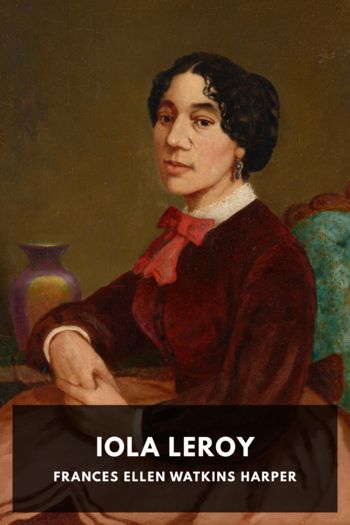Iola Leroy, Frances Ellen Watkins Harper [read aloud books .txt] 📗

- Author: Frances Ellen Watkins Harper
Book online «Iola Leroy, Frances Ellen Watkins Harper [read aloud books .txt] 📗». Author Frances Ellen Watkins Harper
“No, I do not,” replied Dr. Gresham. “I love you for your own sake. And with this the disadvantages of birth have nothing to do.”
“You say so now, and I believe that you are perfectly sincere. Today your friendship springs from compassion, but, when that subsides, might you not look on me as an inferior?”
“Iola, you do not understand me. You think too meanly of me. You must not judge me by the worst of my race. Surely our country has produced a higher type of manhood than the men by whom you were tried and tempted.”
“Tried, but not tempted,” said Iola, as a deep flush overspread her face; “I was never tempted. I was sold from State to State as an article of merchandise. I had outrages heaped on me which might well crimson the cheek of honest womanhood with shame, but I never fell into the clutches of an owner for whom I did not feel the utmost loathing and intensest horror. I have heard men talk glibly of the degradation of the negro, but there is a vast difference between abasement of condition and degradation of character. I was abased, but the men who trampled on me were the degraded ones.”
“But, Iola, you must not blame all for what a few have done.”
“A few have done? Did not the whole nation consent to our abasement?” asked Iola, bitterly.
“No, Miss Iola, we did not all consent to it. Slavery drew a line of cleavage in this country. Although we were under one government we were farther apart in our sentiments than if we had been divided by lofty mountains and separated by wide seas. And had not Northern sentiment been brought to bear against the institution, slavery would have been intact until today.”
“But, Doctor, the negro is under a social ban both North and South. Our enemies have the ear of the world, and they can depict us just as they please.”
“That is true; but the negro has no other alternative than to make friends of his calamities. Other men have plead his cause, but out of the race must come its own defenders. With them the pen must be mightier than the sword. It is the weapon of civilization, and they must use it in their own defense. We cannot tell what is in them until they express themselves.”
“Yes, and I think there is a large amount of latent and undeveloped ability in the race, which they will learn to use for their own benefit. This my hospital experience has taught me.”
“But,” said Dr. Gresham, “they must learn to struggle, labor, and achieve. By facts, not theories, they will be judged in the future. The Anglo-Saxon race is proud, domineering, aggressive, and impatient of a rival, and, as I think, has more capacity for dragging down a weaker race than uplifting it. They have been a conquering and achieving people, marvelous in their triumphs of mind over matter. They have manifested the traits of character which are developed by success and victory.”
“And yet,” said Iola, earnestly, “I believe the time will come when the civilization of the negro will assume a better phase than you Anglo-Saxons possess. You will prove unworthy of your high vantage ground if you only use your superior ability to victimize feebler races and minister to a selfish greed of gold and a love of domination.”
“But, Iola,” said Dr. Gresham, a little impatiently, “what has all this to do with our marriage? Your complexion is as fair as mine. What is to hinder you from sharing my Northern home, from having my mother to be your mother?” The tones of his voice grew tender, as he raised his eyes to Iola’s face and anxiously awaited her reply.
“Dr. Gresham,” said Iola, sadly, “should the story of my life be revealed to your family, would they be willing to ignore all the traditions of my blood, forget all the terrible humiliations through which I have passed? I have too much self-respect to enter your home under a veil of concealment. I have lived in New England. I love the sunshine of her homes and the freedom of her institutions. But New England is not free from racial





Comments (0)